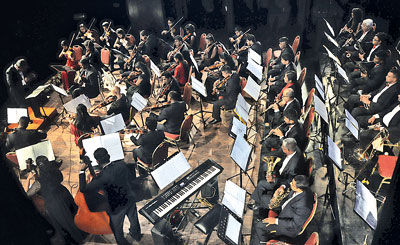Familiar to new: From emotive bursts to some laboured parts

The Krasna Ensemble expanded into a full orchestra. Pic by Nilan Maligaspe
The Krasna Chamber Ensemble presented Mozart’s popular Symphony no. 40 in G minor and lesser known works at the Lionel Wendt Theatre on Saturday, February 25. The programme, an interesting combination of familiar and new works for Sri Lanka’s stage for western classical music included Sri Lanka’s first live performance of Joaquin Rodrigo’s Concierto de Aranjuez with Jude Peiris on solo guitar, as well as The Moldau (Mein Vaterland no. 2) by Bedrich Smetana.
The Krasna Chamber Ensemble metamorphosed into a full orchestra for the event. They showed themselves emotive performers inspired by Director Ananda Dabare in Mozart’s most popular Symphony no.40 in G minor (K.550). The familiar classical harmonies of the popular opening theme brought the orchestra a lovely blend and balance of sounds. The “constant dialogue between the woodwinds and the strings,” as described in the notes to the programme, was beautifully displayed by the singing woodwind section. At times though, it did feel that the performance was somewhat laboured, in contrast to the lightness of being usually associated with Mozart. The counterpoint of the third movement also became somewhat indistinct as the performance grew more emotive and dramatically compelling. But Dabare led with visible enthusiasm and the performers followed their well-loved Director closely to the final flourish, eliciting immediate applause from the audience.
It is encouraging to see that Sri Lanka’s classical music stage has in the recent years promoted more and more guitar repertoire. The Krasna Ensemble joined the adventure that evening with their featured performance of Joaquin Rodrigo’s Concierto de Aranjuez.
Guitar soloist for the evening, Jude Peiris, serves as a Commodore to the Sri Lankan Navy, and a visiting lecturer at the University of Visual and Performing Arts. The guitar concerto he performed is Rodrigo’s most popular composition, considered the height not only of classical Spanish composition but also of the global classical guitar repertoire.
The piece opened with a dramatic guitar solo followed by a well-controlled entrance of the strings which contrasted with the abandon of the previous performance. A sweeping and picturesque first movement vividly demonstrates what the composer reportedly intended the piece to sound like: “the hidden breeze that stirs the treetops in the parks, as strong as a butterfly…a suggestion of times past”. There rose in the second movement (Adagio) a weeping, crying desolation that yearned for subtlety and gentle handling. Unfortunately, the soloist and orchestra both approached this movement rather mathematically, depriving the listener of the full-blooded emotion one expects of Spanish romanticism. The lively third movement closed in a quietness and absorbing calm that left the audience applauding seemingly endlessly.
Smetana’s Ma Vlast (My Homeland) is a cycle of symphonic poems (single movement pieces for orchestra). This is one of the most famous of the Czech composer’s works which embodies the strong nationalist tendencies of his time, in a musical description of the country’s natural and manmade scenery, mythology and history. The full orchestra onstage carries the listener through singing, picturesque chromatic melodies and sparkling drama into a dramatic finale.
Inevitably, the audience demanded more!


